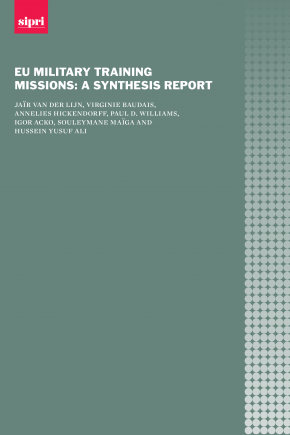The independent resource on global security
EU Military Training Missions: A Synthesis Report

May 2022
Stockholm
SIPRI
This paper draws overarching conclusions based on a synthesis of previously published case studies that examined the impact of EU military training missions (EUTMs) in Somalia (EUTM Somalia, 2010–), Mali (EUTM Mali, 2013–), the Central African Republic (CAR) (EUTM RCA, 2016–). It concludes that EUTMs are relevant niche operations. Despite difficult circumstances beyond the control of the missions, EUTM training and advisory efforts have increased the effectiveness of partner armed forces. While these gains have been marginal in CAR and Somalia, they have been a bit more pronounced in Mali. Yet, broader security sector reform and defence sector reform efforts to improve the accountability and governance of defence and security sectors have become bogged down. The main challenge is that EUTMs are generally mandated to implement largely technical and tactical agendas in contexts where the ongoing armed conflict and the politics of the security sector are not conducive to building professional national security forces. As a consequence, EUTMs find themselves caught up in interlinked and partially overlapping dilemmas. This study concludes with seven partly overlapping recommendations to EU member states and to EUTMs to address the main limitations that are restricting the impact of the missions.
Table of contents
I. Introduction
2. EUTMs and their results
3. Explanatory factors behind the level of impact of EUTMs
4. Conclusions
5. Recommendations



